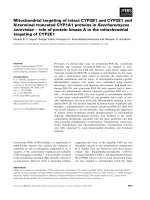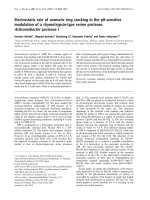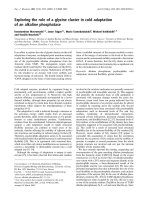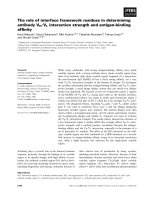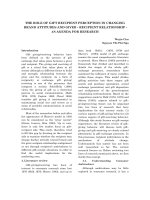- Trang chủ >>
- Thạc sĩ - Cao học >>
- Luật
The role of the united nations convention on contracts for the international sale of goods (CISG 1980) in international business law and Vietnam
Bạn đang xem bản rút gọn của tài liệu. Xem và tải ngay bản đầy đủ của tài liệu tại đây (429.44 KB, 4 trang )
CELEBRATE VIET NAM TEACHERS’ DAY 20/11/2018
ECONOMICS – SOCIAL SCIENCE
THE ROLE OF THE UNITED NATIONS CONVENTION ON CONTRACTS
FOR THE INTERNATIONAL SALE OF GOODS (CISG 1980) IN
INTERNATIONAL BUSINESS LAW AND VIETNAM
NGUYEN THANH LE, NGUYEN DINH THUY HUONG
Faculty of Navigation, Vietnam Maritime University
Abstract
Vietnam has become the 84th contracting state of the United Nations Convention on
Contracts for the International Sale of Goods (CISG), the convention became into force in
1988. From the 1stJanuary 2017 this convention has come into force in the whole territory of
Vietnam. It is necessary to analyze the role of CISG in International Business Law and its
entry into force in the context of Vietnam. This article aims to clarify the duo-role of CISG: a
source of applicable substantive laws in International Business Law and the applicable
substantive law for contracts for the international sale of goods in the case of Vietnam as a
contracting state of this convention.
Keywords: CISG, application Law, contracts for the international sale of goods, contracting state,
entry into force of CISG in Vietnam.
Tóm tắt
Việt Nam đã trở thành quốc gia thành viên thứ 84 của Công ước của Liên hiệp quốc về hợp
đồng mua bán hàng hóa quốc tế (CISG - Công ước Viên 1980), Công ước có hiệu lực năm
1988, kể từ ngày 01/01/2017, Công ước này có hiệu lực ràng buộc trên toàn bộ lãnh thổ Việt
Nam. Sự gia nhập nói trên cần thiết phải được phân tích dưới góc độ vai trò của Công ước
Viên 1980 trong pháp luật thương mại quốc tế nói chung và hiệu lực của Công ước trong bối
cảnh Việt Nam. Bài viết được thực hiện với mục đích làm rõ vai trò của Công ước Viên như
là một nguồn pháp luật áp dụng trong luật Thương mại quốc tế và là pháp luật áp dụng cho
các hợp đồng mua bán hàng hóa quốc tế trong trường hợp của Việt Nam, một quốc gia
thành viên của Công ước.
Từ khóa: CISG, luật áp dụng, hợp đồng mua bán hàng hóa quốc tế, quốc gia thành viên, hiệu lực
của Công ước Viên.
1. Introduction
In the international sale of goods, the United Nations Convention on Contracts for the
International Sale of Goods (CISG 1980) is known as one of the most popular conventions with its
89contracting states. Signed on April 11th 1980, the CISG came into force officially on the1st
January 1988, after being ratified by 11 contracting states. The structure of CISG is divided in 04
parts: Part I - Sphere of Application and General Provisions; Part II - Formation of the Contract;
Part III - Sale of Goods; Part IV - Final Provisions. The sphere of application of CISG does not
apply to: the sale of goods bought for personal, family or household use; the sale by auction; the
sale on execution or otherwise by authority of law; the sale of stocks, shares, investment securities,
negotiable instruments or money; the sale of ships, vessels, hovercraft or aircraft and sale of
electricity (article 2 of CISG). This article limited the category of goods applied under CISG
provision. The CISG is only applied for the international business sale of visible (physically with a
fixed form) and determinate goods. The goods, the consideration of the sale contract must not be
listed in the 2nd article of CISG. The role of CISG in international business law is undiscussed
because of the globalization of this Convention. Moreover, it’s considered as the first substantive
international convention that regulates directly the obligation of the seller and the buyer in a sale
contract instead of resolving the conflict of law as many precedent conventions. The legal basis in
international business law will clarify the role of CISG in the context of Vietnam, especially, from
January 1st 2017, the CISG has come into force in the whole territory of Vietnam.
2. Role of CISG in International Business Law
The international business law’s existence is explained, at the beginning, to determine the
law applicable for foreign trade, stricto sensu, and international exchanges, lato sensu. This
particular role has origin of the absence of a unique and unified legal basis to regulate international
business exchanges. In effect, the question about applicable law takes the central place in
international business law. It’s the consequence of lacking a legal harmonization; therefore, many
disputes in international business law are resolved by the conflict of law. This method will
Journal of Marine Science and Technology
No. 56 – November 2018
43
CELEBRATE VIET NAM TEACHERS’ DAY 20/11/2018
determinate the law applicable of the country in which one party in the contract is domiciled (in
case of individual human being), regardless of his/her nationality (in such case of a non human
being entity a company, a lucrative organization, etc).By giving a direct solution to regulate the right
and the obligation of the buyer and the seller in a contract for the sale of goods, the CISG
contributes an important legal source to international business law (2.1), furthermore, this
convention marks a pioneering role for the unification tendance in international business law at the
end of the 20th century (2.2).
2.1. CISG 1980 - legal source of international business law
To come into force in the whole sovereign territory of a state, an international convention
must be ratified by the state, contracting state, according the rules of the Vienna convention on the
Law of Treaties 1969. After the process of ratification, the convention will be executed, applied as
the in the contracting state. This is the classic manner for an international convention to come into
force in the whole sovereign territory of a state that is also followed by the CISG. When being
ratified by a state-member, the CISG will come into force in the whole sovereign territory of a state.
The CISG will be appllied automatically for all international contracts for sale of goods, according to
its sphere of application (in particular article 1 - Basic Rules of applicability; internationality; relation
to Contracting State and article 2 - Exclusions from the Convention) if the parties of the sale
contract don’t have any other agreement about law applicable (choice of usage or choice the
commercial law of another different state that the parties can make profit from - phenomena tax
dodge of forum shopping). Applied in 89 contracting states, the CISG 1980 has become a true
source of law to reference. In the end of the 20 th century, while the globalization was seeded and
got many remarkable points (the formation of World Trade Organization; the rise in the number of
multilateral trade conventions), the CISG, with a limited and determinated sphere of application
(only for the contract for sale of goods), is appreciated as a great success of the United Nations
Commission on International Trade Law (UNCITRAL).
The CISG, in particular, is considered as a special source of law in International business
law. In fact, due to the absence of a legal unification, the most important issue of international
business law is to determine the law applicable and the competence court within the judicial system
of a state when a dispute exists. However, the conflict of law solution is not proposed in CISG
1980. The jurists, when drafting CISG, had a different solution that could be considered better than
the conflict of law: Drafting a substantive law applicable; within 101 articles regulated in detail the
formation of an international contract for sale of goods. In fact, the CISG does not give us a
solution like the conflict of law that will lead to the application of the law of a determinated state.
The CISG, a substantive law, regulates directly the formation of the contract (included offer;
acceptance; fundamental breach); the obligations of the seller (included conformity of the goods
and third-party claims; delivery of the goods and handing over of documents; remedies for breach
of contract by the seller); the obligations of the buyer (included payment of the price; taking
delivery; remedies for breach of contract by buyer; passing of risk); the provisions common to the
obligations of the seller and of the buyer (included anticipatory breach and installment contracts;
damages; interest; exemptions; effects of avoidance; preservation of the goods).
Moreover, the contracting states of CISG have the reservation right to apply this convention.
This is the reason why the parties in the sale contract whose nationality of the parties or whose the
civil or whose commercial character of the parties or of the contract “is to be taken into
consideration in determining the application of this Convention”, are not depend on the application
of this convention. The parties can agree not to apply the CISG in their contract; or apply the CISG
in adding the other international condition terms (Incoterms); or apply the CISG and another
commercial usage concerning particularly the contracted goods.
On the subject of a contracting state, the CISG has its territorial sphere of application when
being applied for the international contract for sale of goods when the parties whose places of
business are in parties whose places of business are in contracting state. In case of “more than
one place of business, the place of business is that which has the closest relationship to the
contract and its performance, having regard to the circumstances known to or contemplated by the
parties at any time before or at the conclusion of the contract” (article 10 - Definition of "place of
business). If the contracted parties have their place of business in different states that are not
contracting states of CISG, the CISG will still be applied “when the rules of private international law
lead to the application of the law of a Contracting State” (article 1, paragraph 1, subparagraph b).
Finally, there is no requirement neither from nationality, nor the civil or commercial character of the
parties for the parties to use the CISG in their contract (article 1, paragraph 3). That means using
44
Journal of Marine Science and Technology
No. 56 – November 2018
CELEBRATE VIET NAM TEACHERS’ DAY 20/11/2018
the CISG depends directly on the vonlunteer of the parties despite of their nationality or their place
of business.
2.2. CISG 1980 - pioneering role for the unification tendance in international business law
Before the existence of CISG, there were many conventions rarely applicable to international
sale of goods such as: Convention on the Law Applicable to International Sales of Goods (The
Hague, 1955); Convention on the Limitation Period in the International Sale of Goods (New York,
1974); Convention on the Law Applicable to International Sales of Goods Convention on Agency in
the International Sale of Goods (Geneva, 1983). The CISG brings about an adequate solution
concerning the absence of legal unification for international contract for sale of goods that had
never been resolved before. Certainly, to have a common solution for the international contract for
sale of goods gave such a limited sphere of application, according to the 1stfive articles of CISG
concerning Basic Rules of applicability; internationality; relation to Contracting State (artcle1);
Exclusions from the Convention (article 2); Goods to be manufactured; services (article 3); Issues
covered and excluded; validity and the effect on property interest in the goods sold (article 4) and
Exclusion of liability for death or personal injury (article 5). Therefore, theses limits of the sphere of
application are not highly appreciated by many jurists.
Nevertheless, the pioneering role of CISG 1982, in the effort to harmonize and unificate the
unified international business law is undiscussed. Following the success of CISG 1980, the Unidroit
principles were drawn up by Unidroit, the International Institute for the Unification of Private Law in
Roma, Italy. Moreover, the principles on European Contract Law drawn up by the Commission on
European Contract Law (also known as the “Lando Commission”), were inspired by CISG 1980
and the Unidroit Principles. In effect, the European Union always takes a pioneering place in the
legal unification tendance. Therefore, it’s not evidence that the CISG 1980 was signed in Vienna,
the capital of Austria, a member state of European Union, the “cradle” of the legal unification
tendance. Furthermore, the European Union is considered as an intergovernmental organization
that has the most unified legal system in the world.
Grossomodo, there is a duo-role of CISG in international business law: CISG 1980 is not
only the pioneer of unified legal tendance but also a substantive law that has a reference value. For
its 89 contracting states in particular, the CISG is applied for the international contract for the sales
of goods.
3. Role of CISG in the context of Vietnam
The ratification and accession to CISG of Vietnam mark a clear difference between two
legislative processes in Vietnam: Before the CISG accession and after the CISG accession.
3.1. Role of CISG before the accession of Vietnam
The CISG accession plan is classified in a long term project of the Vietnamese National
Assembly and the Government of Vietnam in the goal of promoting the internal economic growth
and accessing to global market. This accession plan is prepared by the participating of Vietnam as
a member of World Trade Organization - WTO, in 2007. During the accession procedure, the
Vietnamese legal system had been reviewed generally and amended totally in multi-domains. This
would help our legal system to have a closer vision in comparison with global standard rules.
Corresponding to the economic integration, the legislative procedure in Vietnam is highly
appreciated. Before 2015, when Vietnam had not been a contracting state of CISG, in many legal
codes, there are certain provisions that are similar with the global standard provisions in business
law. The Arbitration Law 2010, the Commercial Law 2005 (chapter II - sale of goods) that are
similar partially with the modal laws drawn up by UNCITRAL, can be listed as the result of this
harmonization tendance.
The legislative efforts helped our legal system to harmonize with the international legal
standards, however, at that moment, in Vietnam, CISG was only considered as a source of law
with the reference value in international business law. The CISG was applied on the territory of
Vietnam in such would be the case only if “(…) the rules of private international law lead to the
application of the law of a Contracting State” (article 1(1) (b) of CISG). It’s the classic application
method by conflict of law.
In any way, it cannot be denied that the legislative harmonization, in Vietnam, in international
business law and in the sale of goods, is a necessary stage toward the highest legal integration:
the legal unification.
Journal of Marine Science and Technology
No. 56 – November 2018
45
CELEBRATE VIET NAM TEACHERS’ DAY 20/11/2018
3.2. Role of CISG after the accession phrase of Vietnam
Being a contracting state of CISG is a proof for the favorite of Vietnam to the legal unification
process. At the beginning, the Vietnamese legislators had a strategic vision that did not stop at the
legal harmonization. Accessing to the legal unification is the most valuable goal of legislative
project on the subject of CISG. The legal unification helps us to have the transparency in legal
system and in business that will make many positive economic results.
On the 24th November 2015, the President of Vietnam promulgated the Decision n°
2588/2015/QĐ-CTN, concerning the accession of Vietnam to the CISG. This convention came into
force in the whole territory of Vietnam from January 1st 2017. After Singapore, Vietnam is the 2nd
country in ASEAN becoming a contracting state of CISG.
Due to the status of Vietnam as a contracting member of CISG, the CISG is used officially
for the international contract for the sale of goods between the parties whose places of business
are in Vietnam and in 88 others contracting states if the parties in the contract don’t have any
another agreement about the substantive law applicable. Additionally, the provisions concerning
the choice of law applicable for the international contract for sale of goods don’t have any effect
between the parties whose places of business are in different contracting states Vietnam and in 88
others contracting states if the parties in the contract don’t have any another agreement about the
substantive law applicable. If the parties whose places of business are Vietnam and in 88 others
contracting states of CISG don’t determinate the law applicable for the contract, nor have any
another agreement about the substantive law applicable, the CISG will be applied automatically for
the contract. Furthermore, if the rules of private international law lead to the application of the law
of Vietnam, the CISG will be applied for the contract. It is important to remind that “neither the
nationality of the parties nor the civil or commercial character of the parties or of the contract is to
be taken into consideration in determining the application of this Convention” (article 1(3)).
However, when the parties in the contract don’t have any another agreement about the substantive
law applicable, the criteria to determinate the application of CISG is the element of “place of
business”, instead of the nationality of the parties.
The CISG accession is classified in a long-term project of Vietnam in order to promote
economic growth and to access to international trade.
4. Conclusion
In conclusion, in international business law, the CISG is an important substantive source of
law for the sale of goods. The CISG is not only a reference source of law but also a substantive law
applicable as the result of the conflict of law. Furthermore, the CISG is applied for the sale contract
of goods in the contracting states if the parties in the contract for sale of goods do not have any
another agreement about the substantive law applicable.
REFERENCES
[1] CISG for Vietnamese practitioners accessed at .
[2] UNCITRAL, Thirty-five Years of Uniform Sales Law: Trends and Perspectives, 2015.
[3] CISG Database of Pace Law School accessed at: />Received:
Revised:
Accepted:
46
11 January 2018
14 March 2018
08 Apirl 2018
Journal of Marine Science and Technology
No. 56 – November 2018


